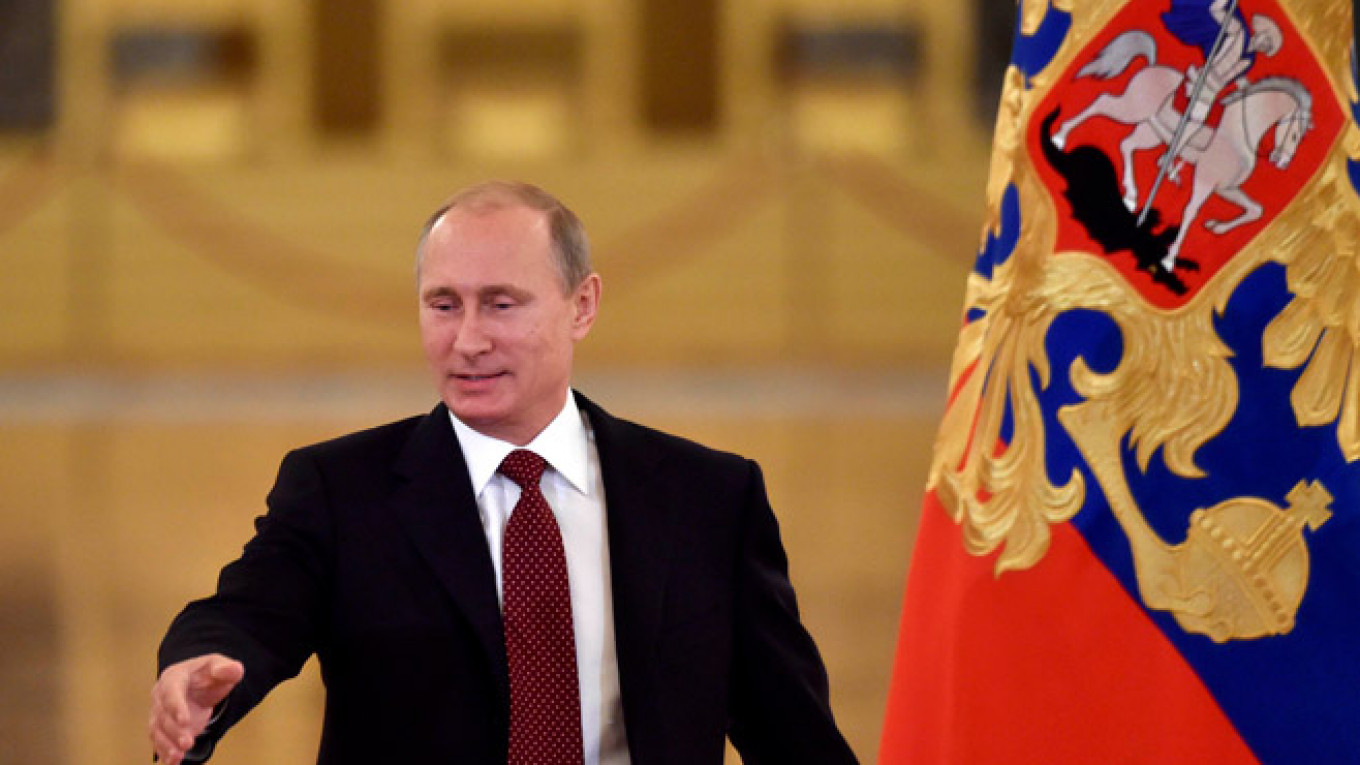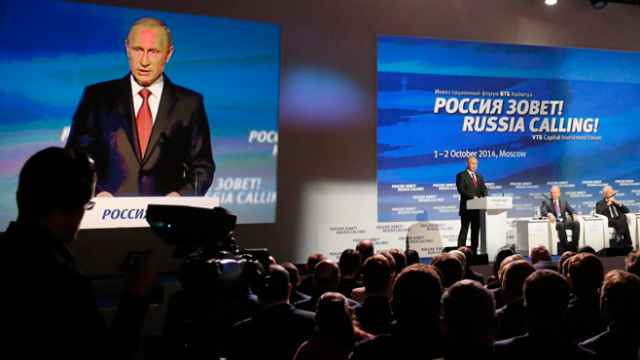Most of Russia's indicators of economic health have plummeted this year. Inflation last month was at its highest level in three years, capital outflow this year is expected to exceed $100 billion, the ruble has lost almost 20 percent of its value since January, and economic growth is anaemic, with some experts predicting that Russia will be in recession by 2015.
At the same time, 62 percent of Russians believe that everything is going in the right direction, up from 40 percent one year ago, when economic difficulties were only in experts' forecasts. Eighty-six percent currently approve of what President Vladimir Putin is doing as head of the Russian state. In the latest poll this week, Russians gave Putin an average mark of 7.33 out of 10 for his performance as president, up from 6.07 a year ago.
These surveys were all conducted by the independent Levada Center in the last two months, among 1,600 respondents with a margin of error not exceeding 3.4 percent.
Russia's leading economists, sociologists and political pundits talked to The Moscow Times about the connection between the government's approval ratings and economic indicators, and what the threshold might be after which Russia's silent majority could become more skeptical of the government's policies.
The Russian government is currently able to keep social expenditure under control due to vast reserves accumulated from oil windfalls during the last 15 years, and Putin is trusted by the public at large to be able to resolve the situation due to his track record since 1999, so the political situation will remain stable up until there is a sudden shock, analysts said.
Western sanctions, designed to inflict enough pain on the Russian economy to affect the government's public approval, are not generating the intended effect and are therefore largely ill-advised, they said.
Rainy-Day Reserves
The price of oil, which contributes more than 50 percent of Russia's federal budget revenues, has fallen by more than 18 percent this year, but the government has several ways to keep its social expenditure high, according to Vladislav Inozemtsev, director of the Moscow-based Center for Post-Industrial Studies, a think tank.
"You can print more money, you can devalue the currency, there are many possibilities, so there is no direct and immediate link between the economic situation and political stability," he said in a phone interview.
"This is a big proble because in countries that don't depend on oil as much as Russia, the feedback between economy and society is much more immediate," he said.
Russia had $454 billion in its reserves at the beginning of October. During the 2008-09 economic crisis, the Central Bank spent more than $200 billion in reserves in less than a year to keep the country's banks and key industries afloat, as well as to ensure that the ruble's devaluation was gradual.
According to Inozemtsev, the Russian government has enough reserves to keep the situation stable for at least 18 months.
"Putin would have to make a deliberate effort to ruin this situation [of stability] now, but in the long term there could be a change," he said.
A Question of Pride
For the average Russian, national pride is far more important than economic indicators that can only be comprehensively assessed by specialists, said Alexei Levinson, director of social and cultural research for the Levada Center.
"Even when we do see real economic troubles, they will not immediately translate into widespread dissent," he said in a phone interview.
"Sanctions will not work: The policymakers who imposed them were wrong in their calculations," he said.
Levada research shows that Putin's rating in the last 15 years has never gone below 60 percent. His popularity peaked twice: at 88 percent in September 2008 — following Russia's brief war with Georgia — and then again this August, when it soared to 87 percent amid violent conflict in neighboring Ukraine.
Levinson said it is impossible to calculate the threshold that would precipitate a public loss of confidence in Putin.
"This situation has no precedent, so it is difficult to predict what its ultimate outcome will be," he said.
No Action Without a Shock
Alexei Makarkin, deputy director of the Center for Political Technologies think tank, said the current situation can be compared to the Soviet Union in the mid-1980s, when economists were sounding the alarm but the population at large was lulled into a sense of false security by relative stability.
But when oil prices dived in 1986, people suddenly felt that "they can be economic experts too," according to Makarkin.
"As the Soviet Union collapsed, everybody realized that the economy is relevant and its indicators affect everybody," he said.
Some analysts have claimed that economic ills are being camouflaged by state-run media, which blames factors that are not under Russia's control for them. According to Makarkin, this view is simplistic.
"Propaganda only stirs up authentic sentiments, such as imperial nostalgia and so forth. If there was a significant dissonance between what they said on television and what people felt and saw around them, propaganda would not work," he said.
"No one will take action until all hell breaks loose," he concluded.
Contact the author at [email protected]
A Message from The Moscow Times:
Dear readers,
We are facing unprecedented challenges. Russia's Prosecutor General's Office has designated The Moscow Times as an "undesirable" organization, criminalizing our work and putting our staff at risk of prosecution. This follows our earlier unjust labeling as a "foreign agent."
These actions are direct attempts to silence independent journalism in Russia. The authorities claim our work "discredits the decisions of the Russian leadership." We see things differently: we strive to provide accurate, unbiased reporting on Russia.
We, the journalists of The Moscow Times, refuse to be silenced. But to continue our work, we need your help.
Your support, no matter how small, makes a world of difference. If you can, please support us monthly starting from just $2. It's quick to set up, and every contribution makes a significant impact.
By supporting The Moscow Times, you're defending open, independent journalism in the face of repression. Thank you for standing with us.
Remind me later.






